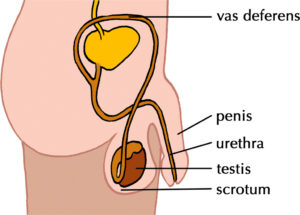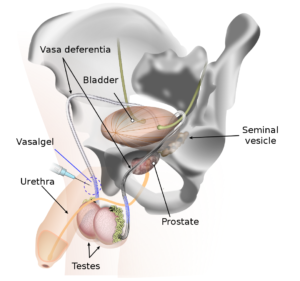Whether it’s an IUD, an implant, a shot or a daily pill, birth control is a regular part of many adult women’s lives. It has left a lot of women asking: Why not men? Why are they spared?
Well, it’s not simple. Let’s take a look.
With all the abundance of choices women have in the contraceptive realm, men, on the other hand, have only two choices:
- condoms – a barrier form of contraception that stops sperm reaching and fertilizing an egg
- vasectomy – a minor surgical procedure that stops sperm being ejaculated from the penis during sex (it is usually permanent). We don’t want this usually!
For years, scientist have tried to create other alternative birth control methods for men, realizing that this is an untapped market.

There are two directions that this research went:
Hormonal contraception
The World Health Organization commissioned a few years ago what sounded like a promising trial, a two-hormone injection designed to temporarily stop the development of healthy sperm. Initial results looked like it would be 96 percent effective in preventing pregnancy in the participants’ partners. (The effectiveness rate for women’s birth control pill is 99%). But the Stage II trial was stopped after an independent review panel found that the drug had too many side effects. The most common side effect was acne, and sometimes it was pretty severe. Some men also developed mood swings and in some cases those mood swings got pretty bad. One man developed severe depression, and another tried to commit suicide.
I can already see eye rolling from women at this point knowing that women have been experiencing things like mood swings and weight gain for decades with hormonal birth control pills without complaints! But when we do it we go all the way and we don’t take side effects lightly! We are big babies after all, aren’t we?
The other reason this trial was stopped is that even though it seemed a very sound theoretical approach with very good results in the beginning some men, despite all this, still carried on producing enough sperm to cause a pregnancy! Cause: unknown! Aren’t we stubborn sometimes? Yes, we are!
Non-hormonal contraception
One very promising avenue of research is a technique called reversible inhibition of sperm under guidance (RISUG). During this technique, a non-toxic synthetic chemical, a polymer called VASALGEL is injected into the vas deferens. This is the tube that sperm pass through on their way to the penis. This tube is cut during a vasectomy. (hence the name: vas-ectomy – cutting the vas!).

The chemical reacts and blocks the vas deferens. It also kills sperm when they come into contact with it. The chemical is effective almost immediately after it is injected.
The chemical stays in place until a man decides that he wants to have children. It can then be washed out using another injection which dissolves the polymer and flushes it out of the vas deferens. Another advantage of Vasalgel is that while it blocks sperm, other fluid can still pass through. This should reduce any risk of pain due to back pressure, an occasional issue with vasectomies (fluid backup!)
A variation of this technique is the intra-vas device (IVD). It involves injecting a “plug” into the vas deferens which can be removed later. The IVD filters out the sperm as it passes through the vas deferens.
Initial results of RISUG and IVD are promising, but further research is needed to assess the long-term effectiveness and safety of both techniques. But it seems that this is way to go with men.

Why is it harder to develop birth control for men than women?
That’s the big question. There are a couple of reasons. One is that it’s harder from a biological point of view. If you think about it, it’s a numbers game: Women produce one egg a month, while men are producing millions of sperm constantly (as a side note: it has been calculated that a man will produce in a lifetime an average of 110 liters of semen – the equivalent of an average bathtub! Or a big fish tank! I hope they are wrong!) With women, you can take advantage of their normal monthly cycle with the birth control pill. There’s nothing equivalent to that in men. We produce sperm relentlessly! 1,500 sperm cells per second! That’s right, you read well!
Other reason is the un-willingness of men to take some side effects (hormonal especially).
And the third reason is that funding this type of research is tough. In fact, there’s more money dedicated to figuring out how to best to sterilize your family dog than there is to research new male contraceptives! Nice, right?
For women, it will be life-changing to have men help out in the contraceptive department, with a method other than condoms. They could replace or supplementing a woman’s existing method—both partners taking something is better than one.
This would be a game changer for couples, as well as single women and men. It would move the contraceptive burden into shared territory.
